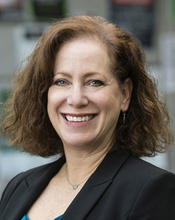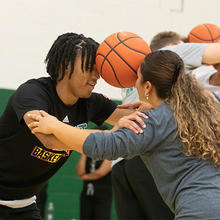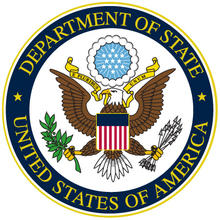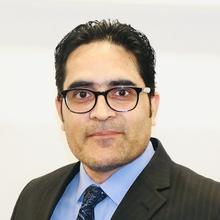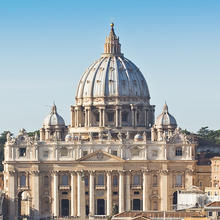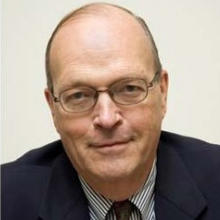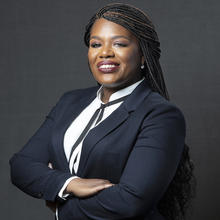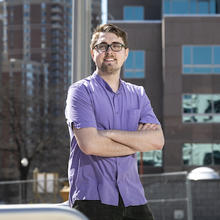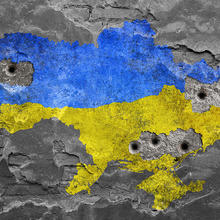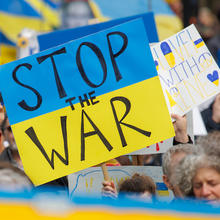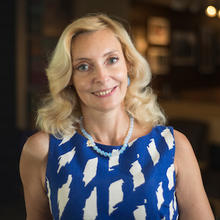Carter School News
- November 10, 2022On the morning of Wednesday, October 26th, George Mason University professor Suzanne C. de Janasz conducted her first-ever negotiations workshop for female high school students at McLean High School in Northern Virginia. An enthusiastic audience of about 100 young women came to hear de Janasz explain why negotiation is important for women of all ages and walks of life, and how to build negotiating skills for the future. De Janasz, an organizational researcher who holds a joint appointment in the School of Business and the Carter School for Peace and Conflict Resolution, says there is a pervasive cultural bias against women who ask for what they deserve. The negative labelling begins in childhood, with terms such as “bossy” being applied to more assertive girls.
- October 21, 2022Graduate students at Mason Square (formerly Arlington Campus) recently attended Movers and Shakers, a professional networking event with Arlington’s business, government, and community leaders.
- October 5, 2022For one of the more than 35 events of Peace Week Fall 2022, the Carter School partnered with Mason Men’s and Women’s Basketball programs on a joint initiative with PeacePlayers International, an organization that works with youth from divided communities around the globe, using basketball as a vehicle to unite, educate, inspire, change perceptions, create opportunities for peacebuilding, and develop leaders.
- August 22, 2022In partnership with the U.S. Department of State-sponsored Community Solutions Program, the Carter School is proud to welcome five community leaders from Bangladesh, Guatemala, Palestine, and Slovakia. Together, these fellows will participate in a four-month practicum with the Carter School.
- July 25, 2022In partnership with the GMU Afghan Scholars Program, the Carter School welcomes Dr. Mansoor Ehsan. A political analyst and researcher, Dr. Ehsan joins the Carter School as Scholar in Residence for a year beginning summer 2022.
- June 28, 2022George Mason University Carter School professor Richard Rubenstein attended a workshop conference at the Pontifical Academy for Social Sciences at the Vatican on June 6-7 to discuss peacemaking in Ukraine and other global conflict sites. The conference was organized by the U.N. Development Solutions Network headed by Columbia University professor Jeffrey Sachs.
- June 15, 2022We at the Carter School were saddened to learn of the passing of our friend and colleague, Joseph V. Montville. Joe died peacefully surrounded by family, a well-deserved blessing.
- May 20, 2022This summer, Congresswoman Cori Bush will be co-teaching a graduate-level course entitled, “The Public Pedagogy of Truth and Reparations.”
- May 9, 2022Despite being more than 5,000 miles away from the war in Ukraine, students at George Mason University’s Carter School for Peace and Conflict Resolution are actively assessing the conflict dynamics, with hopes that their research could improve the situation.
- April 7, 2022The Carter School has collected articles and seminars written and presented by our faculty to help researchers, peacebuilders, and knowledge seekers understand the scope and impact of Russia’s war on Ukraine. As new resources become available, they will be added to this page.
- March 30, 2022Peace and Conflict Resolution scholars and foreign affairs practitioners convened at the Jimmy and Rosalynn Carter School’s Point of View research and retreat facility in Mason Neck, Virginia issued the following appeal to the conflicting parties in Ukraine.
- March 4, 2022The ongoing war in Ukraine is unique from other conflicts, and the international community can take five actions to control the situation, said Karina Korostelina, professor and director of the Program for the Prevention of Mass Violence at George Mason University’s Carter School for Peace and Conflict Resolution. Korostelina shared her perspective over Zoom:

